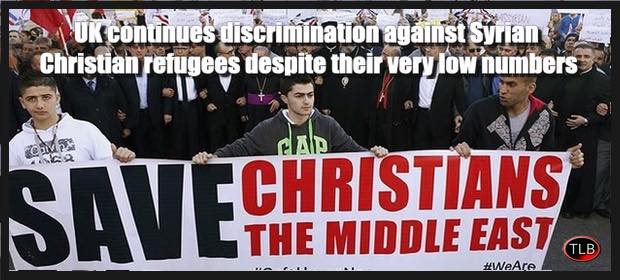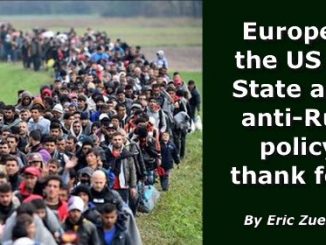
No Christians from Syria resettled by Britain
The British Government recently appointed its first Special Envoy on Freedom of Religion or Belief. But the Special Envoy has done very little for Christians.
FREEWEST MEDIA
Lord Tariq Ahmad of Wimbledon (pictured below), a former minister, was given the lofty position. According to the government, the Envoy “will promote the UK’s firm stance on religious tolerance abroad, helping to tackle religious discrimination in countries where minority faith groups face persecution”.
 But not a single Christian was among the Syrians resettled in the UK in the first three months of this year.
But not a single Christian was among the Syrians resettled in the UK in the first three months of this year.
Prime Minister Theresa May said she would be “supporting [Lord Ahmad] in this new role as he works with faith groups and governments across the world to raise understanding of religious persecution and what we can do to eliminate it”.
Syrian Christians seem to be excluded from this group, however. The Barnabas Fund, a charity that supports persecuted Christians, has discovered that the UN High Commissioner for Refugees (UNHCR), during the first quarter of 2018, recommended that 1,358 Syrian refugees resettle in Britain, of which only four were Christians. The British Home Office then agreed to resettle 1,112 of these refugees, all of whom were Muslims, and refused to accept any of the Christians.
It agreed only to resettle Muslims and rejected the four Christians recommended by the UN High Commissioner for Refugees (UNHCR), despite past US declarations that ISIS was committing genocide against them.
The disclosure was obtained by the Barnabas Fund under freedom of information laws only after a long  legal battle with the Home Office. According to Premier, the charity explained it had to “go to considerable lengths to obtain these figures in the face of what appeared to be a sustained attempt by Home Office officials to avoid their release”.
legal battle with the Home Office. According to Premier, the charity explained it had to “go to considerable lengths to obtain these figures in the face of what appeared to be a sustained attempt by Home Office officials to avoid their release”.
Martin Parsons, head of research at the Barnabas Fund, told The Times: “We think there is a cultural problem. We don’t want them to prioritise Christians — we want to prioritise people on the basis of vulnerability.”
The decision by the Home Office was made despite the fact that some 10 percent of the pre-2011 population of Syria was Christian – a number that has reportedly fallen to 5 percent. There were also an estimated 70,000 Yazidis in Syria. Yazidis, with Christians, were among the groups most viciously targeted by ISIS in Syria and Iraq.
Moreover, according to the Barnabas Fund, in 2017 the UNHCR recommended that 7,060 Syrian refugees be resettled in the UK, of whom only 25 were Christians and seven were Yazidis. The Home Office eventually accepted 4,850 Syrian refugees – of whom only 11 were Christians.
It is evident that the Home Office favors Muslim over Christian refugees. Lord David Alton of Liverpool, a life peer in the House of Lords, noted in a letter to Home Secretary Sajid Javid that both the Home Office and the UNHCR were biased against Christians:
“There is widespread belief, justified or not, among the religious minorities of Syria that the UNHCR is biased against them. The UK has a legal obligation to ensure it does not turn a blind eye to either direct or indirect perceived discrimination by the UN.
“It is widely accepted that Christians, who constituted around 10 per cent of Syria’s pre-war population, were specifically targeted by jihadi rebels and continue to be at risk.
“…As last year’s statistics more than amply demonstrate, this is not a statistical blip. It shows a pattern of discrimination that the Government has a legal duty to take concrete steps to address.”
The “a pattern of discrimination” has been ongoing since 2015. According to the Barnabas Fund, the UNHCR, in 2016, recommended 7,499 refugees to the UK, of whom only 27 were Christians and five were Yazidis. In 2015, out of 2,637 recommended refugees, 43 were Christians and 13 were Yazidis.
The apparent discrimination against Christians by the United Kingdom and the UNHCR is all the more disturbing in light of several studies showing that Christians belong to the most persecuted faith in the world. Christians are “the most widely targeted religious community, suffering terrible persecution globally”, according to a 2017 study by the University of Notre Dame’s Center for Ethics and Culture, the Religious Freedom Institute and Georgetown University’s Religious Freedom Research Project. In June, the ninth annual Pew Research Center report on global religious restrictions also found that Christianity was still the world’s most persecuted faith, with Christians being harassed in more countries (144) than any other group.
Even if Theresa May declares that her government stands with persecuted religions all over the world, there have been no specific initiatives safeguarding Christians, other than empty words.
Nina Shea, Director of the Center for Religious Freedom of the Hudson Institute, asked the UN’s High  Commissioner for Refugees at the time, António Guterres (pictured), to explain the disproportionately low number of Syrian Christians resettled abroad by the UN in December 2016: “Mr. Guterres said that generally Syria’s Christians should not be resettled, because they are part of the ‘DNA of the Middle East,’” Shea said.
Commissioner for Refugees at the time, António Guterres (pictured), to explain the disproportionately low number of Syrian Christians resettled abroad by the UN in December 2016: “Mr. Guterres said that generally Syria’s Christians should not be resettled, because they are part of the ‘DNA of the Middle East,’” Shea said.
Guterres’ statement was a blunt admission of the UN’s apparent disregard for Christian lives. A short 9 months earlier, in March 2016, US Secretary of State John Kerry had pointed out that “(ISIS) is responsible for genocide against groups in areas under its control including Yazidis, Christians and Shiite Muslims”.
CONTINUE READING HERE
ER recommends other articles by FreeWest Media




